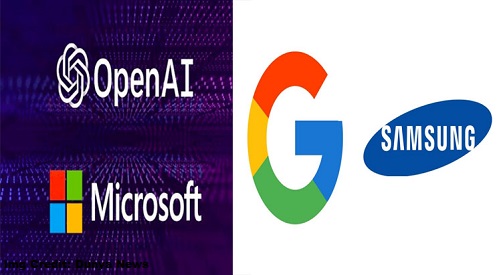EU Scrutinizes AI Deals Between Microsoft-OpenAI and Google-Samsung

The
European Union is potentially poised to launch an antitrust investigation into
Microsoft's partnership with OpenAI and Google's artificial intelligence (AI)
deal with Samsung, driven by concerns surrounding exclusivity clauses in these
agreements. Margrethe Vestager, the EU competition chief, announced that
regulators would be gathering additional third-party opinions on these deals.
This step underscores a broader regulatory anxiety regarding Big Tech's
extension of market dominance into emerging technological sectors.
In
March, Vestager took proactive measures by dispatching questionnaires to major
technology firms such as Microsoft, Google, Facebook (now Meta), and TikTok.
These inquiries aimed to gather information on their AI partnerships. The
responses from these companies have prompted the EU to issue follow-up requests
for more detailed information, with particular focus on Microsoft's agreement
with OpenAI. The primary concern revolves around whether the exclusivity
clauses embedded within this partnership could potentially harm competition by
restricting access to critical AI technologies and thereby disadvantaging other
competitors in the market.
Reuters
was the first to report that the EU is actively building a case that could
culminate in a formal investigation into the partnership between Microsoft and
OpenAI. Vestager has clarified that Microsoft's partnership with OpenAI does
not fall under the EU's merger rules due to the absence of control. This
distinction is crucial because, while OpenAI operates as a nonprofit
organization, Microsoft has made significant investments amounting to USD 13
billion in OpenAI's for-profit subsidiary, effectively securing a 49 percent
stake. This substantial investment underscores the strategic importance of the
partnership to Microsoft and raises questions about market power and
competitive practices.
Google's
agreement with Samsung, inked in January, is also drawing regulatory scrutiny.
This deal involves embedding Google's generative AI technology into Samsung's
Galaxy S24 series smartphones. The integration of advanced AI technologies into
widely used consumer devices such as smartphones has significant implications
for market dynamics and competition, warranting close examination by
regulators.
In
addition to these high-profile partnerships, Vestager is also turning her
attention to the practice of "acqui-hires," where companies acquire
other firms primarily to gain access to their talent and technology. An example
of this is Microsoft's USD 650-million acquisition of Inflection, a startup
that allowed Microsoft to leverage Inflection's models and hire a majority of
its staff. This practice raises further concerns about the consolidation of
talent and technology within a few dominant players, potentially stifling
innovation and competition in the industry.
The
EU's scrutiny of these AI partnerships and acquisitions reflects a broader
regulatory effort to ensure that the rapid advancement and integration of AI
technologies do not lead to anti-competitive practices that could harm
consumers and stifle innovation. By examining these deals closely, the EU aims
to maintain a balanced and competitive market environment in the face of
evolving technological landscapes.